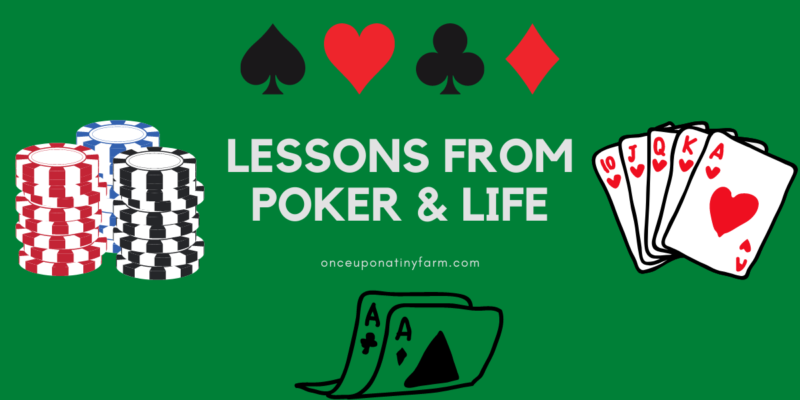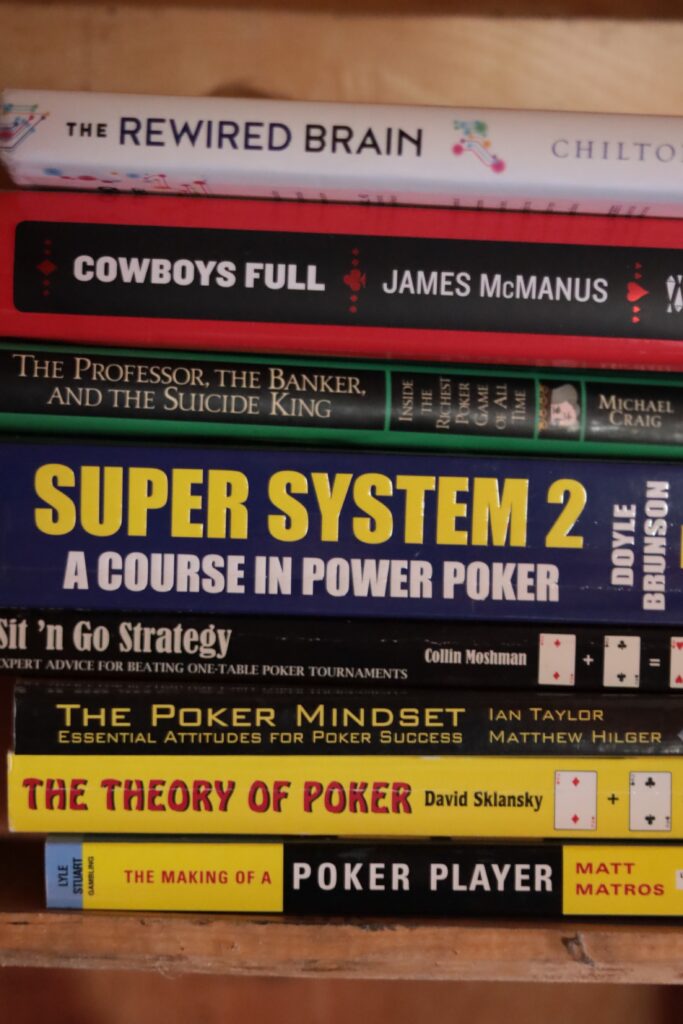 I don’t talk about this much, specifically here on this blog, but I spent more than half of my life involved with the game of poker. Mostly by playing, but also on the other side of the felt, as a poker dealer. Throughout those years, I’ve seen and learned a great deal (no pun intended). Many of the lessons that pertain to poker directly correlate to every day life. Even though I’m no longer involved with the game as I once was, poker has helped mold me into the person I am today, and I will carry those lessons with me forever. I would like to share a few of those takeaways in this post.
I don’t talk about this much, specifically here on this blog, but I spent more than half of my life involved with the game of poker. Mostly by playing, but also on the other side of the felt, as a poker dealer. Throughout those years, I’ve seen and learned a great deal (no pun intended). Many of the lessons that pertain to poker directly correlate to every day life. Even though I’m no longer involved with the game as I once was, poker has helped mold me into the person I am today, and I will carry those lessons with me forever. I would like to share a few of those takeaways in this post.
One might think the most difficult part of playing poker is handling what’s considered a “bad beat,” which is when you get unlucky to lose a hand you would typically win. When playing poker, you’re forced to accept the fact that luck is a factor in every given hand, and you cannot allow that to be a factor in your behavior. You have to stay level headed for the very next hand and reset your mind as if it never happened. No–what stings the most as a card player is not getting unlucky, but being manipulated by your opponent and forced to fold what would have been the winning hand. When you only needed to stand strong in your position, your belief that you held the best hand, yet you became fooled in a moment of weakness where fear takes over–the fear of losing a large amount if you’re wrong.
Sometimes in those moments, facing fear and uncertainty, our mind plays tricks on us in order to protect ourselves. It’s not always the right thing to do, specifically during a game of poker, just simply an observation of human nature and one very literal way poker correlates to every day life.
It’s hard to admit when you’ve been manipulated. It never gets easier, no matter how long you’ve been playing. The best players tend to take notes of these memorable hands and try to learn from them and adapt their games to better perform in future situations. But for some players, it’s much too painful to replay a losing hand over again, so they lie to themselves and pretend it didn’t actually happen. They don’t record any notes or keep records of wins and losses, because it would be too painful to look at. They refuse to acknowledge any evidence. They’re blind to the truth. They choose to be ignorant to the truth, because otherwise, they’d have to acknowledge that they’ve been manipulated in the first place. Outsmarted. Beaten. It’s hard to get past that. So sometimes cognitive dissonance occurs so we can “protect ourselves.”
We try and convince ourselves that what just happened didn’t really happen. We lie to ourselves just to get through those tough times so we can still look ourselves in the eye at the end of the day.
Some people are so easy manipulated and don’t realize it. Some people think they understand the game of poker because they read some generic throwaway book that explains the basics. They think they are an expert because they understand the rules and how to play. They know how to go through the motions of a given hand and sometimes they’ll win and sometimes they’ll lose. But they don’t know how to win. They don’t employ any strategy. Most players don’t win in the long term. They don’t realize they’re losing players. They don’t want to know. It would be too uncomfortable to be faced with the truth. If they were honest with themselves, the game would no longer be fun or enjoyable. They don’t observe their opponent’s tendencies or make any efforts to improve their game. They play on autopilot and are easily manipulated by their opponents over and over again. As soon as this type of player sits down at the table, all of the good players salivate over the easy money that just sat down, knowing the game is about to get good.
When things don’t go their way, they’ll often criticize their opponents, calling them names, and even chastise the dealer for giving them “bad luck.” You see, it’s never their fault. They refuse to admit that the people consistently winning are doing anything differently than they are, they just get “luckier” more often. They don’t want to acknowledge that they themselves are unwilling to put in the work to become a better player. Maybe they don’t even know how to improve or what leaks in their game need to be improved upon. They’re often singularly focused only on their next move and let the “luck of the cards” fall as they may, rather than deploying any type of offensive strategy to win the hand outright. In chess this is considered an “end game,” which is the strategy used to win at the end of the match. They just continue playing the game on autopilot, and the sharks continually win their money as they never make any efforts to change their approach, in blissful ignorance that they’re doing anything wrong.
Sometimes this type of losing, undisciplined player will get lucky and win a hand against a stronger player, and will suddenly proceed to explain to the other player what they did wrong to lose the hand! How crazy is that? Of course, the stronger players at the table will laugh under their breath at the absurdity of their comments because they know it’s only a matter of time before they give it all back again.
I’ve always found it interesting how the people with the least amount of knowledge and self-awareness have the confidence to loudly announce their opinions and viewpoints, yet the more intelligent people whose opinions we should highly value are often quiet, guarded, and full of doubts.
Another takeaway from the game of poker is that there is always something new to be learned. You don’t know what you don’t know. My game went to another level when I realized I wasn’t the best and that others were beating me. I had to be honest with myself and adapt my playing style to better combat my opponent’s strategies.
Lastly, a big lesson from playing poker is to “zoom out.” By zooming out, you can see the bigger picture. In poker, just as in life, we get too caught up in the minute details, the little things out of our control. But if you’re constantly making sound decisions and playing well, even if you have a bad day at the poker tables, you can look at your graph documenting wins and losses and remind yourself that it’s just a blip in the grand scheme of things and you’re still a winning player. You can zoom out from that one losing session, that one bad day, and remind yourself that you’re on the right path and suddenly it doesn’t hurt so bad. You rewire your brain and prepare for the next battle tomorrow. A good parallel to life, is it not? If you’re always thinking of the “big picture” at all times, it doesn’t matter what bad things may have happened yesterday. Stay the course and don’t let yesterday’s mishaps affect you tomorrow.
In order to learn these things, you have to keep an open mind and be honest with yourself. If you’re not pushing the current version of yourself to become a better player or person, or making any attempt to better your overall situation, you’re doing a disservice to your future self, and things will never get better.
We won’t progress as humans if we just stop questioning things. Life won’t get better if we stop asking “why?” Why do we do things this way? Who gives this person the right to claim something is inherently true, or that one specific way is the best way to do something? What if you discovered a better way to live? What if you unlocked a new strategy that helps you win in previously unwinnable situations? What if you discovered a painful truth that no one wants to talk about? It’s highly likely that your discovery would be criticized by those who refuse to change their ways or see things differently. Change can be hard to accept, and like I mentioned above, no one wants to admit they’ve been manipulated.
Small shifts in the way we think can help us overcome many obstacles and often leads to success. But first, we must get past the way we’ve been programmed to go through the motions. We have to make an effort to get better. Sometimes that requires surrounding yourself with people who are better than you are in whatever field you’re looking to improve in and learning from them. If no one in your circle shares your interests, you need to seek out those who do and absorb what you can.

It can be challenging to do anything that goes against the grain of what is considered “normal,” especially difficult for those around you to understand. But if no one ever challenged any “norm” or tried to do things differently, we would never advance as a society, or as human beings.
Whatever it is you’re going after, follow your heart’s desire–your God given intuition, and give all of yourself to be successful. There are no half measures. You have to go all-in. Give all of yourself to the endeavor, and win or lose, you’re always going to be better for it.
Can you think of a time in your life where you’ve been manipulated in a major way? Were you able to admit it to yourself? Was it difficult to do so? Did you learn from it? Let me know in the comments.




Leave a Reply